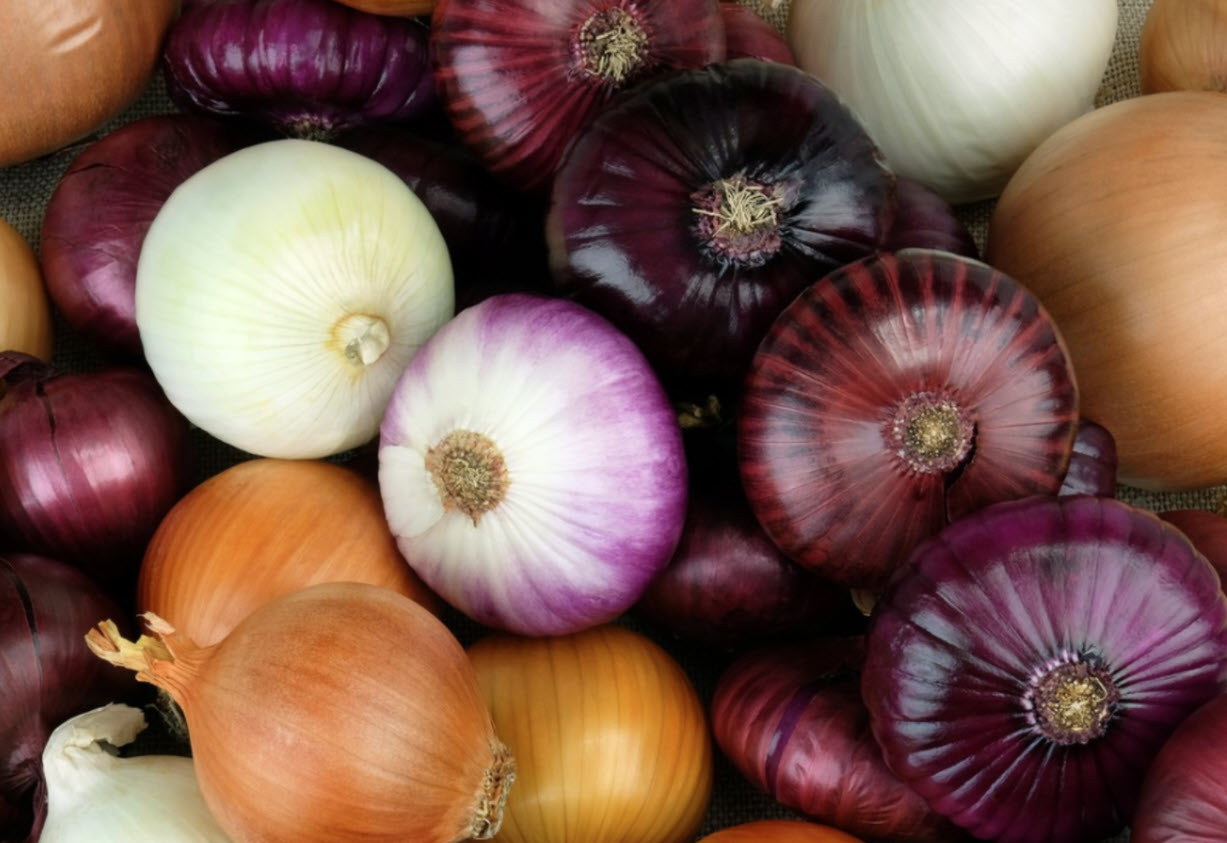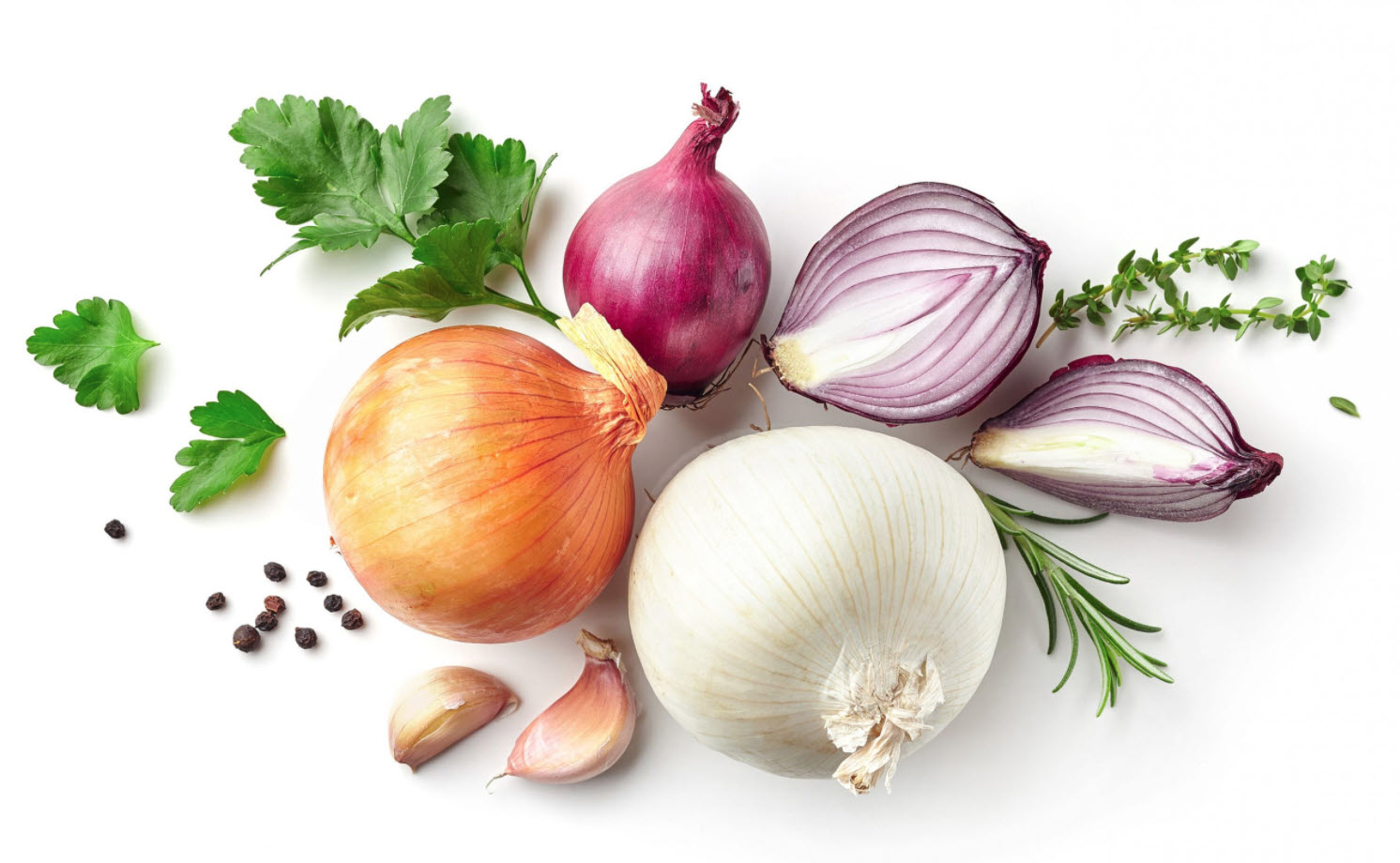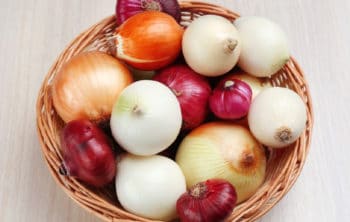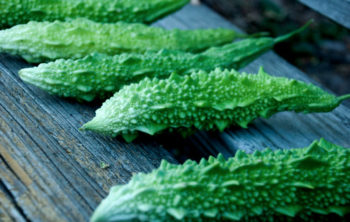Contents
Onion: Nutrition And Benefits for Hair, Skin and Health
Onion, which is known for to make you cry while chopping, is a vegetable. It not only enhances the taste of the food but gives you various health benefits as it is full of nutrients. Onions are a versatile vegetable that is rich in nutrients beneficial for hair, skin and overall health. Here we will discuss the nutritional value of onions, as well as their benefits for various aspects of health. We will also explore ways to include onions in your diet for optimal benefit. Read on to learn more about this amazing vegetable!
What is Onion?
Onion (Allium cepa), the bulbous flowering plant,is a vegetable and it is widely cultivated for its edible onion bulbs. Other names include onion grass, shallot and multiplier onion. As one of the oldest vegetables known to man, onion has been used as both food and medicine since ancient times.
The word “onion” comes from French ‘oignon’ that came from Latin “unio” which means single bead. The onion was named after an old Egyptian pyramid because it grows in layered structure like a pyramid or onion layers. Each layer can be harvested separately over a period of time extending up to 10 months which explains why they are so cheap at grocery stores during some seasons.
Onion is closely related to garlic and both are originally native to Central Asia, although they have become widely cultivated all over the world. The onion was first recorded in history by French botanist Tournefort during 1699-1700 when he traveled through Persia (Iran) and wrote about onion’s growth in eastern Mediterranean region where onion was already a staple food before 3000 BC. The oldest onion remains were discovered near modern-day Esfahan city in Iran from Bronze Age settlements dating between 2900 – 2350 BCE.
In onion field, there are many layers of skins which protect onion from insect attacks and keep moisture inside the onion called epidermis or tunica externa. There is a thin layer below onion epidermis called tunica media or albedo.
There is another layer under onion’s albedo which is called tunica interna of onion bulb and this layer is the thickest layer with a very strong cellular tissue where onion stores most of its nutrients. Onion cells divide rapidly in tunica interna and they produce more layers which results in onion bulb growth. On the other hand, onion leaves have hollow air filled stems to help them grow taller without being too heavy as onion bulb.
They don’t store much water because air takes lots of space inside onion stem as well as inside onion leaves. In addition, there are two types of onion bulbs: dry type and fresh type determined by during storage after harvest where fresh onion types have a wet surface or dry onion types have a dry surface.
Onion Nutrition:
Onion contains a vast amount of nutritional value which are as follows:
- Energy: 100 gm of raw onion gives 40 kcal.
- Carbohydrates: About 10 percent of raw onion is made from carbohydrates. These carbohydrates are mainly simple sugar, starch and fibre. 100 gm of raw onion contains about 9-10 gm of carbohydrates.
- Fat: It is almost a fat-free vegetable; 100 gm of uncooked onion has only 0.1 gm of fat.
- Protein: It has only 1% of protein.
- Fibre: Onion is a very rich source of fibres. 100 gm of it, has 1-3% of fibres. A very important fibre of onion is known as fructans, which is a prebiotic fibre. It is essential for maintaining normal immunity and movement of the intestine.
- Vitamin: It contains good amount of vitamins. 100 gm of raw onion provides 14% of daily requirement of vitamin C, which is essential to improve immunity. Other than vitamin C, it contains vitamin B complex, vitamin A and vitamin E as well.
- Minerals: It is good for a hypertensive person because it has 7 times higher potassium compares to sodium. It is also good source of iron and magnesium (10% of daily requirement) and a rich source of sulphur.
- Antioxidants: Onion provides full bag amount of antioxidants. One of the important anti-oxidant is quercetin, which is potent anti-inflammatory substance.
Health Benefits of Onion:
What are onions good for? Onions are a popular vegetable that is used in many recipes. They have a flavorful taste and are packed with nutrients. Onions are good for your health and can provide numerous benefits. In this blog post, we will discuss the health benefits of onions and some ways to include them in your diet. We hope you enjoy!
1. Mental Health:
Rich amount of folate, found in onion, plays important role in the treatment of depression and mood swings. Flavonoids and anti-oxidants content of it, also relieve tension and anxiety.
2. Onion for Eyes:
Sulphuric acid of onion may produce tear in eyes, but it also decreases chances of blepharitis and other eye infection. Sulphur content of it is a natural antibiotic and anti-inflammatory.
3. Nose bleeding:
Some unknown contents of it help to stop nose bleeding.
4. Mouth Infection:
Chewing onion may prevent you from kissing because of bad stinky smell of it, but antibiotic properties of it prevent gingivitis and bleeding gum, more effectively than other toothpastes and mouthwashes. Allium and ally disulphide of it are two important activated sulphur contents, which prevents the growth of bacteria by destroying the cell wall of bacteria.
5. Chest Health:
Rich content of vitamin C and phytochemical present in onion reduce respiratory tract infection. Fresh onion juice also relieves cough and throat irritation. According to various studies, its juice also prevents allergic reactions like asthma, allergic rhinitis and eosinophilia.
6. Heart Health:
Flavonoid and thio-sulphide, both are natural blood thinner and also play an important role in lowering low-density cholesterol. Onion also deduces the process of atherosclerosis. All these factors combinely provide and maintain a healthy heart.
7. For Digestive system:
Onion is a natural appetite enhancer. Antibiotic and anti-inflammatory properties of it reduce infection and swelling in stomach and intestine. Quercetin, a phytochemical of it prevents cancer, especially cancer of stomach and colon-rectal.
8. For Genital organs:
In oriental medicine and ancient Chinese system of medicine both use onion to enhance sexual drive. It is a natural aphrodisiac and also strengthens sexual organs, especially of men. Study suggests onion is rich in L-Arginine which increases blood flow towards the heart. During sexual excitement blood flow towards penis and genital organ increases, L-arginine plays some positive role in sexual drive.
9. Onion for Skin infection:
External application of onion juice relieves in eczema and itching. It also reduces bacterial skin infection.
10. Onion for hair:
Application of onion paste is the best natural hair care. It not only removes dandruff but also increases blood circulation towards hair follicles. Anti-bacterial properties of it reduce follicle infection and promote hair growth.
11. Onion for diabetes:
Polyphenol in it plays an important role in sugar metabolism. A high amount of poly-phenol, S-methyl cysteine and quercetin reduces blood sugar level. Poly-phenol also incites insulin formation from pancreas.
12. Onion for blood pressure:
Onion reduces low-density cholesterol and blood vessel tightening, thus reduces blood pressure. It does not cause sudden lowering of blood pressure, so it should not be used for first-line treatment.
Interesting Fact About Onion:
- Most of the nutritional contents are found in the outer layer of the onion. So always make sure to peel it as less as possible.
- It is very potent anti-bacterial, but after peeling, it starts to attract lots of fungus and bacteria. So always be precautious about the following things:
- Never consume wet onion.
- Do not take onion which is stored after chopped or peeled 1-2 hour before.
- Always take fresh dry properly stored onion only.
Various uses of onion:
- Eye infection: put 1-1 drop of fresh onion juice in both eyes. It will cause tearing but prevent various types of eye infections.
- Acne: It is a natural antibiotic thus it prevents acne and makes skin shiny and glossy. For this, apply the mixture of onion paste and potato juice on the face or you can massage face with 1-2 onion fresh slice.
- For hair: Make paste of two onions and apply on hair from hair root to ends. After 1 hour, wash with normal water. Alternatively, you can also apply its juice in hair route and let it be there all night, wash in next morning.
- Digestion: To enhance appetite, take 5ml of its juice after meal. Or take it in salad regularly during meal.
- Mouth cleaner: Chewing of fresh onion or massage from juice or mouthwash from the decoction of onion, all are good habit for a healthy mouth.
- Chest infection or cough: Mix honey, onion juice and ginger juice in equal amount and drink 5 ml this mixture twice a day. It will ease in chest congestion and allergic reaction.
- For sexual health: Mix honey and onion juice in equal amount and take 10 ml of this mixture for 15 continuous nights.
Conclusion:
The benefits of onion are vast, and can be used to benefit your health as well as the appearance of your skin. We hope you enjoyed this blog post on onions! If you want more information about other foods that provide beauty or nutritional benefits, please visit our website for a list of articles related to these topics.
Read more: Apple: Nutrition, Health Benefits, Usage and Side Effects
Disclaimer:
Above article is only for knowledge purpose. Please contact your healthcare provider before using any of above medicine or method. For any query or personal consultation according to your health condition please contact your doctor.




